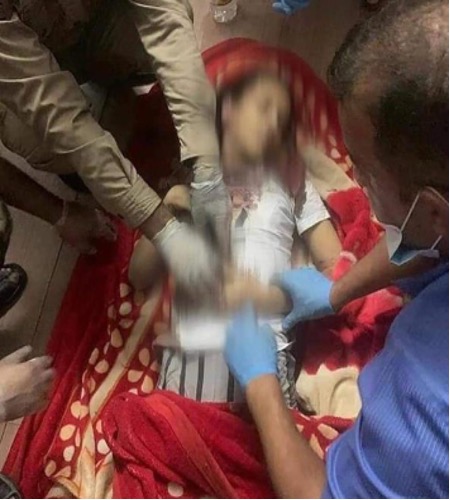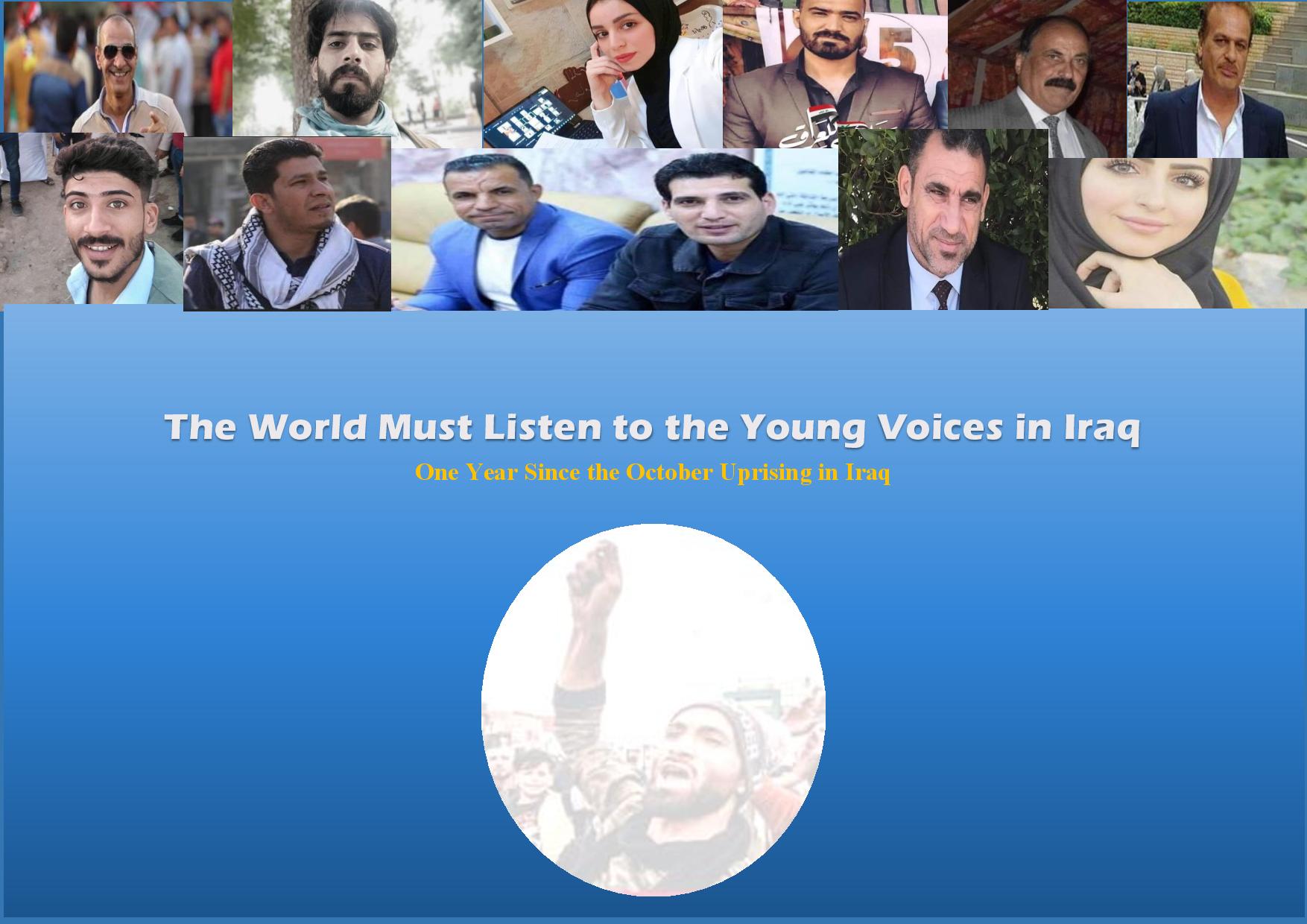One Year Since the October Uprising in Iraq
By Hannah Bludau/GICJ
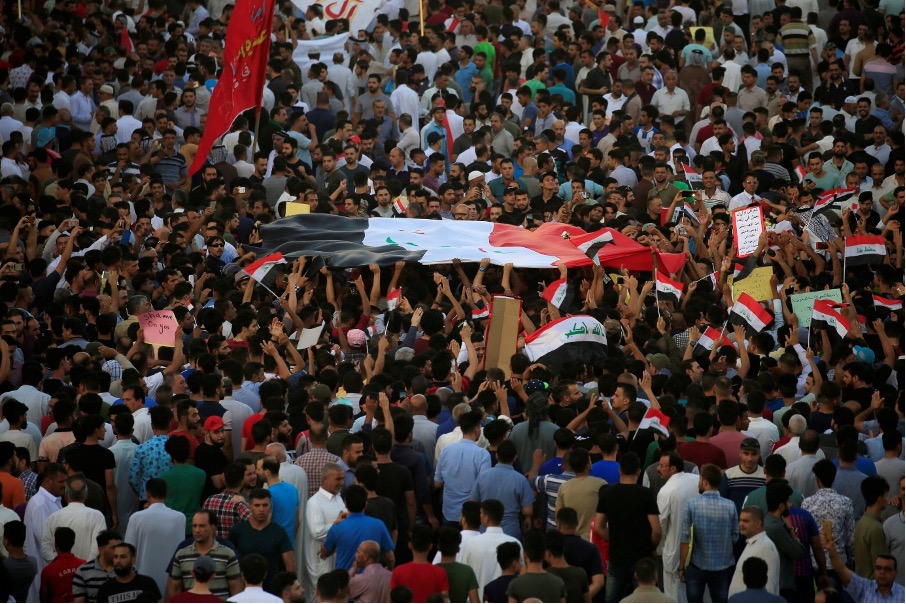
01.10.2020
Executive Summary
One year has passed since the nationwide protests in Iraq began on 1 October 2019 and the Iraqi people continue their fight for fundamental change and justice.
Prior to 2019, protests sparked by increased grave and systematic human rights violations by Iraqi authorities have continuously taken place for many years in Iraq. Demonstrators have demanded a prohibition of the death penalty and torture within prisons, the release of arbitrary detained persons and that the government provide information to the families of disappeared persons arrested in previous years. Forced displacement, widespread corruption, the lack of basic services and employment opportunities, poor living conditions and the lack of accountability of government officials for poor public services and their exploitation of Iraq's wealth have also been the catalyst for mass demonstrations across the country.
The demonstrations on the first of October have brought a change in demands. At the core of these demands is the dismantling of Iraq’s sectarian system of government, which discriminates according to ethnic quotas. The demonstrators have instead developed a different vision for Iraq, which should be a nation for all its citizens, regardless of their ethnic or religious or sectarian backgrounds, and that the government be a truly democratic and sustainable political system. Since the demonstrators are calling for a fundamental change of the entire system, the demonstrations have continued despite the change of Prime Ministers and governmental officials.
Demonstrators also demand that any future government must be free of those that participated in the sectarian system of government since 2003 (ministers, militia leaders, members of the parliament, governors, etc.), as they are all connected to grave human rights violations, including killing and torture, and to a web of corruption that has plundered Iraq’s wealth and resources. Many of these governmental officials have also been accused of human trafficking Unless they are removed from power and held accountable, they will continue the systematic human rights violations and corruption that cripples Iraq.
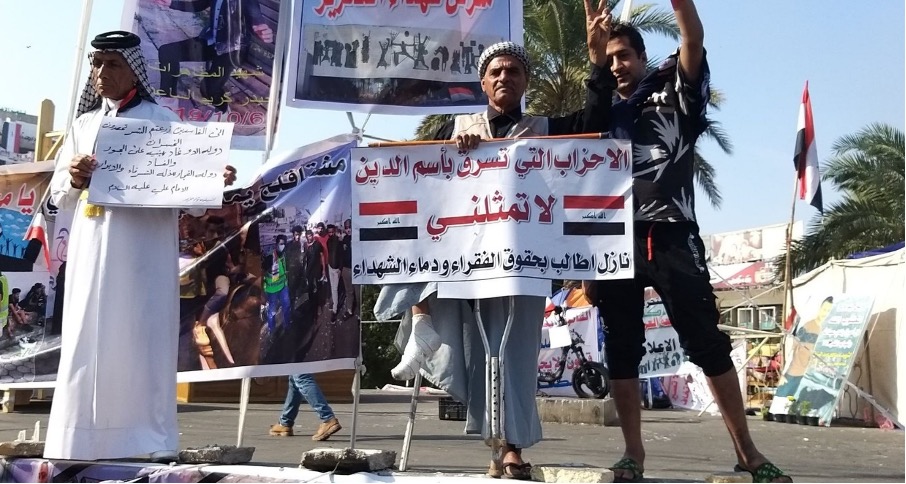
The demonstrator above holds a poster stating the following: “The ruling parties do not represent the Iraqi people; on the contrary, they are stealing in the name of religion. We are here to demand the rights of the poor and the martyrs.”
Throughout these demonstrations, demonstrators have been met with grave human rights violations by both the Iraqi security forces and militias.
Despite the COVID-19 pandemic, demonstrations have persisted, and protestors remain strong in the face of adversity. This should not mean that the international community should remain silent on the huge violations and crimes committed against them. The importance of their cause and maintaining its momentum renders it their duty to continue protesting and fighting for their cause while, at the same time, taking the necessary precautions to protect themselves from the virus.
From the first hour of the demonstrations, Geneva International Centre for Justice (GICJ) has continued to document the violations and draw the attention of the competent international bodies to these violations. GICJ has continued to work towards ensuring accountability for the perpetrators and demanding the protection of the demonstrators.
For this reason, GICJ repeats its calls for the establishment of an international commission of inquiry to investigate all human rights violations in Iraq in order to hold all perpetrators accountable and achieve justice for the victims.
On the occasion of the one-year anniversary of the Iraqi Youth Revolution, GICJ calls on the international community to listen carefully to the voices of the Iraqi youth and understand their demands for change. All they desire is a better future so that they can fulfill their dreams and hopes, which have been destroyed over the past 17 years by sectarian parties that have forced them to live without adequate education, employment opportunities and basic needs, leaving them without any hope for the future. Now that they have sacrificed their lives, the time has come for the international community to help them pursue their goals and aspirations to secure a better future.
Background on Violations against Demonstrators:
From Extrajudicial and Summary Executions to Enforced Disappearances
Over the past year, GICJ has documented grave violations against the demonstrators perpetrated by various forces belonging to the Iraqi authorities (army, police, federal police, security forces, counterterrorism unit, rule of law forces). Among all these forces, the militias have been at the forefront of the violations. The militias have continually subjected the demonstrators to violence with all forms of weapons, while the demonstrators merely waved flags.
The numbers of victims tend to vary. UNAMI and OHCHR has documented the deaths of 487 protesters and 7,715 incidents of injury from 1 October 2019 to 30 April 2020. The High Judicial Council informed UNAMI and OHCHR that the judicial system received 524 complaints for deaths related to the demonstrations and 3,424 complaints for injuries related to the demonstrations. On 31 July 2020, the Prime Minister of Iraq indicated that violence during demonstrations up to that date had killed at least 560 people, including individuals and security personnel.
According to our sources from the demonstration sites, GICJ documents that the number of those killed since October 2019 has totalled more than 800, with more than 25,000 injured, of whom about 4,000 are permanently disabled.
GICJ has documented many cases of abductions, assassinations, and assassination attempts. A growing number of demonstrators, human rights defenders and journalists have been forcibly disappeared. It is almost certain that the abductions are being carried out under Iraqi government orders, whether carried out by government security personnel or affiliated militias.
Most of the cases occur while these activists are returning to their homes from demonstrations.
There are over 700 demonstrators who were subjected to abductions. About 150 of them remain forcibly disappeared.
The differing numbers should not distract from the fact that in only a short period of time, thousands of innocent demonstrators were and are continuously subjected to severe human rights violations.
To read about more cases of the victims, click here |
Demonstrators, including schoolchildren and students, have been subjected to excessive violence and use of force, including beatings with rubber batons, stones, and electric sticks. Security forces have arbitrarily detained countless demonstrators, who are then subjected to brutal forms of torture and threats against their family.
Many detainees were only able to inform their families of their whereabouts after several days, the whereabouts of many remain unknown, which caused and continues to cause much distress to family members. The detainees were not informed of the reason for their arrest and arrests were carried out without an arrest warrant. Interviews were carried out without a lawyer present and detainees were not brought before a judge in the time required by law. Those arrested are subjected to torture and inhuman or degrading treatment.
Governmental forces and militias are not only attacking protest leaders and activists but are also intentionally targeting medics whose only objective is to treat those who have already fallen victim to the violence.
Since the beginning of August 2020, GICJ witnesses a surge in abductions, assassinations, and intimidation. All attacksoccurred near security facilities and headquarters, confirming that the security forces failed to protect innocent civilians and instead allowed militias to carry out their systematic killings. The assassinations are consistent with the militias’attempts to silence opposition and prevent activists from gaining political influence.
The Role of Iraqi Women: Pioneers of Political Activism
Iraqi women of all ages have played a vital role in the demonstrations. Initially, they were hindered in their participation, out of fear for themselves and their families as well as the security situation, threats, and socio-cultural norms, but day by day, they became leading figures in the demonstrations. Iraqi women have not only challenged these difficulties but have actively overcome them. Women´s rights have diminished since 2003 and these demonstrations have therefore provided a platform for women to regain and fight for their rights and freedoms.
Through their participation, they were able to feel more secure and ease their fears about the participation of their relatives, which encourages the participation of their loved ones. Many women lost sons or husbands in the violence of the demonstrations but continued to protest, nonetheless. Their participation has thus given impetus to the demonstrations, encouraging others to also participate.
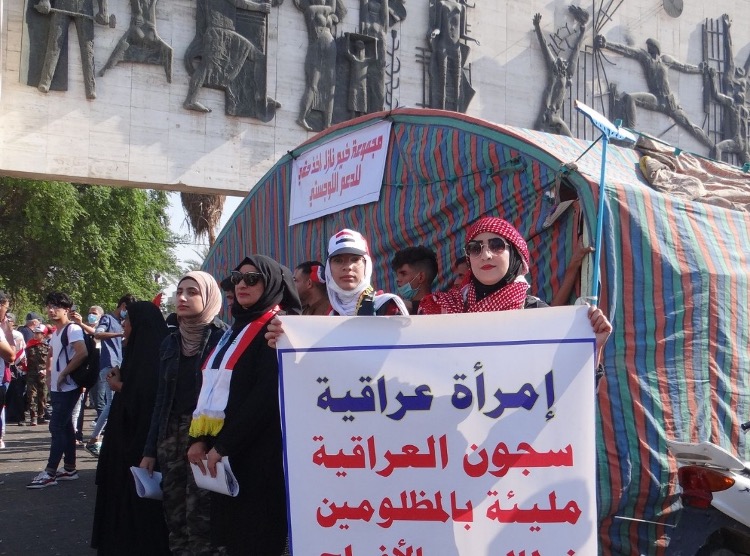
Among the many roles the women have played in the demonstrations, they give first aid to injured. They also prepare food and drink for the protesters, organize the layout of the demonstration sites, and collect donations to support the cause. Iraqi women have also organized women’s marches and demonstrations, calling both for women’s rights and the rights of everyone. The role of Iraqi women as vulnerable women has been transformed into a pioneer of political activism. Many of these women have been subjected to abductions, severe injuries, and assassinations.
|
|
UN Response
The United Nations Assistance Mission in Iraq (UNAMI) has released five reports on the demonstrations that outline the violence and human rights violations committed against demonstrators. GICJ would like to mention that the information provided by UNAMI is not entirely reliable given the security circumstances in which UNAMI operates. Nevertheless, GICJ refers to the reports published by UNAMI, as they provide insight into the severity of the violations.
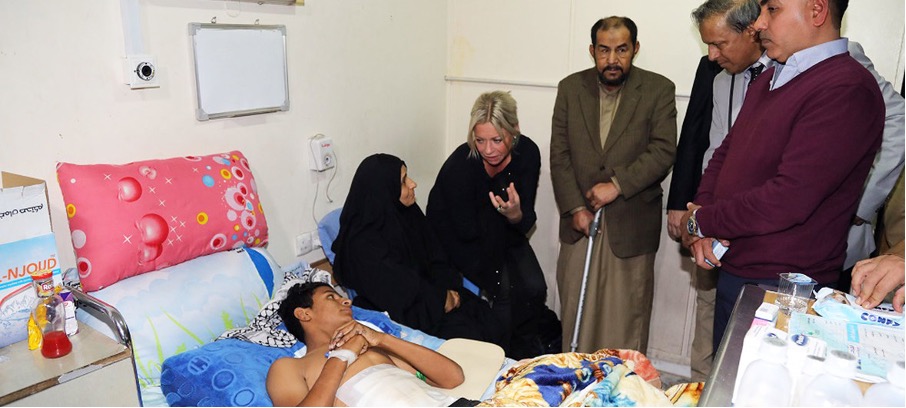
UN Special Representative Jeanine Hennis-Plasschaert visits injured protesters in al-Kindi hospital in Baghdad, Iraq in November 2019. Photo from UNAMI.
UNAMI has documented that, from the outset, security forces responded to the peaceful protests with excessive force, live ammunition, and the indiscriminate and disproportionate use of less-lethal weapons.1 In the first week of demonstrations, specifically from 1 to 9 October 2019, UNAMI reported that violence caused at least 157 deaths and 5,494 injured.
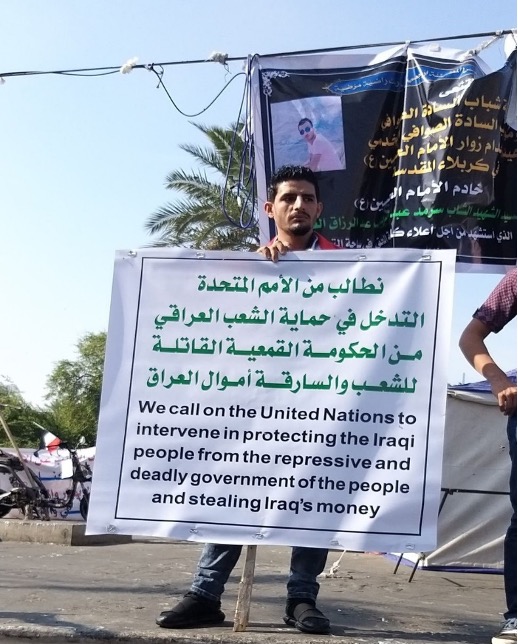 UNAMI reports that demonstrators were deliberately targeted by individuals on rooftops and in vacant buildings referred to as ‘snipers.’ UNAMI also reported that the “severity of tear gas” made the areas of Tahrir Square inaccessible and as a result, volunteers and medics were constantly evacuating injured demonstrators in ambulances and Tuk Tuks.2 Some of these volunteers and medics were then hit with tear gas canisters. Ambulance drivers were reportedly shot at by the security forces. Security forces also entered hospitals in Baghdad to intimidate medical staff and interrogate and arrest wounded demonstrators.
UNAMI reports that demonstrators were deliberately targeted by individuals on rooftops and in vacant buildings referred to as ‘snipers.’ UNAMI also reported that the “severity of tear gas” made the areas of Tahrir Square inaccessible and as a result, volunteers and medics were constantly evacuating injured demonstrators in ambulances and Tuk Tuks.2 Some of these volunteers and medics were then hit with tear gas canisters. Ambulance drivers were reportedly shot at by the security forces. Security forces also entered hospitals in Baghdad to intimidate medical staff and interrogate and arrest wounded demonstrators.
UNAMI refers to the suppression of news coverage of the demonstrations, noting attacks against media outlets, orders not to film or cover the demonstrations, arbitrary arrests of journalists, harassment, intimidation, illegal confiscation of equipment, the deletion of video footage or photographs, and the blocking of internet and social media.
On 23 May 2020, UNAMI and OHCHR published a report documenting the cases of 123 people who disappeared between 1 October 2019 and 21 March 2020.3 UNAMI and OHCHR reported on the arrest of some 3,000 demonstrators by the security forces and expressed concerns about arbitrary deprivation of liberty, freedom of expression and peaceful assembly and procedural guarantees.
UNAMI and OHCHR have stated that the Iraqi government has “failed to make concrete efforts to protect those at risk or to pursue accountability.” The UN found that the “absence of accountability for these acts continues to contribute to the pervasive environment of impunity in relation to demonstration-linked reports of violations and abuses.” The report details the government’s overt reluctance to investigate abductions and locate the victims, despite the fact that families have filed official complaints.
Jeanine Hennis-Plasschaert, the Special Representative of the UN Secretary-General for Iraq and Head of UNAMI, stated on 27 August 2020 that, the “continued targeting and killing of activists and human rights defenders” amounts to a “deliberate silencing of peaceful voices.” UNAMI and OHCHR have also stated that the attacks aimed at creating an environment of fear and intimidation to discourage others from participating in protests.
Governmental Threats and Intimidation
Based on daily information and contact with numerous organizations and committees, GICJ has determined that there are many politicians, including members of Parliament, who are actively fuelling the systematic targeting and increased acts of violence against activists and human rights defenders. Recorded television interviews with the former Prime Minister, Nouri al-Maliki and member of Parliament, Khadum al-Sayadi, reveal encouragement, justification and approval for these attacks. The two have, in interviews and numerous posts on social media, denied the identity of the victims as activists, instead calling them U.S. foreign agents and thus a threat to Iraq. These false assertions are an attempt to discredit the victims and justify the attacks.
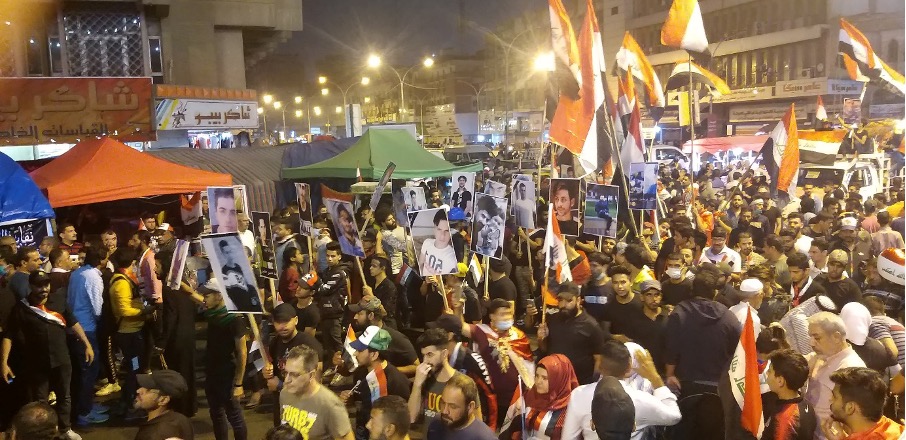
Iranian media indicate the extent of Iranian involvement in these attacks. In an attempt to legitimize the assassinations, the Iranian news agency, Mehr, falsely claims that the activists were recruited by the U.S. consulate in Basra. Portraying the activists as foreign agents, the Iranian media suggest that the activists wish to damage the Iraqi-Iranian relations and the reputation of the Iranian-backed militias.
It is worth briefly mentioning two articles published by Mehr, which highlight the targeting of activists. Long before the assassinations began, names and photos of those recently assassinated were published in an article dating back to 2018. The activists were said to be pawns in an American scheme to gain political influence in the region and undermine the Iraqi-Iranian relations. In an interview with the Spokesman of Al-Sadiquon Bloc, Mahmoud al-Rabibee, published on 24 August 2020 in Mehr, the U.S. is accused of being behind the assassinations, in an attempt to create chaos in Basra and bring it under U.S. influence.
The article from 2018 is referred to each time an activist is assassinated in an attempt to prove their ties or support for the U.S. and thus justify the attack.
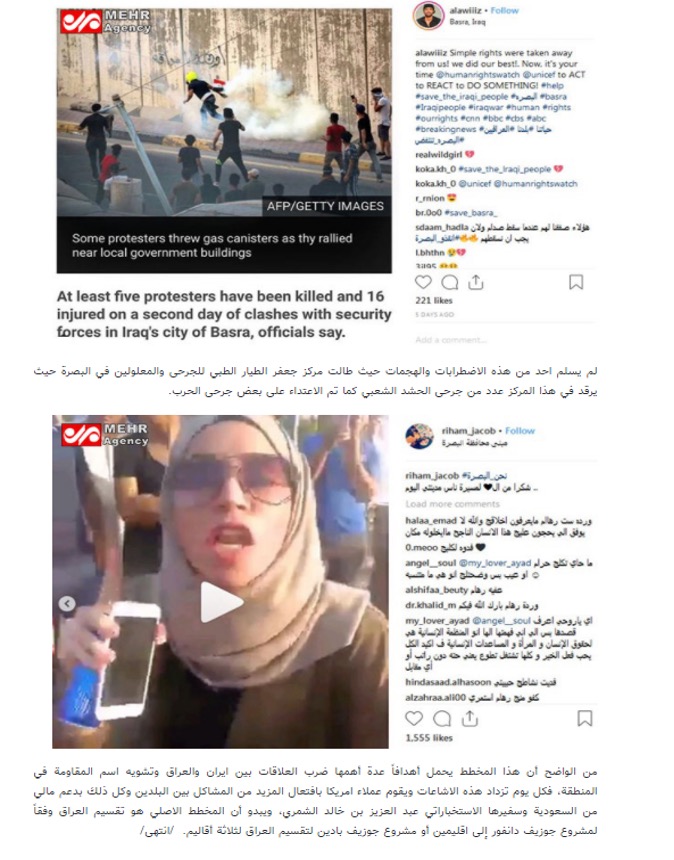
The above article of the Iranian newspaper Mehr published in 2018 includes an image of Dr. Reham Yacoub, who was assassinated on 19 August 2020, confirming that Iranian-linked militias are behind the assassinations of activists.
Plagued by corruption and overwhelmed by the systematic interference of the government and the militias, the judiciary is incapable of providing victims with redress or holding perpetrators accountable. The right to a fair trial has thus not only been violated, but effectively eradicated. Lawyers are consistently subjected to threats and intimidation by authorities, and in particular by the office of the Prime Minister and the Prime Minister itself.
This has been the case in Iraq for years. Indeed, as Former United Nations High Commissioner for Human Rights, Navi Pillay, said in 2013, “the criminal justice system in Iraq is still not functioning adequately, with numerous convictions based on confessions obtained under torture and ill-treatment, a weak judiciary and trial proceedings that fall short of international standards.” Navi Pillay described the Iraqi justice system as “too seriously flawed to warrant even a limited application of the death penalty, let alone dozens of executions at a time.”
Years later, similar words are echoed. On 27 August 2020, with reference to the complete impunity enjoyed by the perpetrators, the Head of UNAMI declared: “Without accountability, the crimes committed will remain mere statistics, numbers on a page.” Impunity and utter lack of accountability perpetuate these grave human rights violations, which are further exacerbated by the absence of an independent judicial system.
|
The Role of the Militias According to credible information received by GICJ, the militias are heavily involved in the violations against the demonstrators. Equipped with military weapons and vehicles, they storm the demonstration areas, not only in Baghdad but also in other governorates. Besides using live ammunition against the demonstrators, which has resulted in countless dead and injured, they also use various tactics to intimidate the demonstrators and prevent them from participating, such as sending threatening messages through social media, to their homes and through telephone calls, as well as threatening their families. The militias are also responsible for kidnapping many human rights activists. Some of them are released after an interrogation during which torture techniques were used, and they were forced to sign documents that force them to declare that they would no longer participate. Threats and intimidation against activists, especially against those assassinated, were carried out by leaders of the al-Hashd al-Shaabi militias, mainly Asa'ib Ahl al-Haq, the Hezbollah militia, Badr Brigade, Saraya Al-Salam. These militia leaders are often openly accusing the activists of being foreign agents of the U.S. and other countries, and have broadcasted these allegations, including threats, on their media platforms.
The images above depict the scene of the brutal killing of the Ali Ja´far Ali Al-Sultani family. The picture on the left shows how the murderers wrote on the walls of the family’s home that the crime was committed by the Peace Companies and soldiers of al-Sadr. The picture on the right shows Ali Ja´far Ali Al-Sultan´s son Abbas, born in 2013. The Iraqi Prime Minister is powerless against the militias as they are superiorly armed compared with Iraqi security forces. These militias have confiscated heavy artillery and advanced weaponry and are supported by Iran, rendering them a major power to challenge state security forces and influence the Iraqi government and political landscape. The militias influence all aspects of Iraqi government, including the executive, legislative and judicial branches.4 |
Geneva International Centre for Justice Actions
GICJ has continuously documented the human rights violations against civilians, activists, human rights defenders and demonstrators in Iraq and drawn the attention of the UN relevant bodies and representatives to these violations; particularly the Special Rapporteur on Extrajudicial, Summary, or Arbitrary Execution, High Commissioner for Human Rights, and the Special Representative of the Secretary-General for Iraq and Head of UNAMI. GICJ's efforts to end impunity, for these and other violations in Iraq, have not gone unheard. In part due to all its efforts, the violations against demonstrators have been addressed by UN representatives and the special mandate holders.
Even before the October demonstrations began, in a letter to the High Commissioner for Human Rights on 14 February 2019, GICJ called on the High Commissioner to take immediate action on three urgent issues in Iraq; namely, enforced disappearances, the situation of prisons, and human rights defenders in the country. GICJ urged the High Commissioner to pressure the Iraqi government to release detainees, close secret prisons, and work with the international community to ban all militias in Iraq in order to stop the never-ending stream of human rights violations perpetrated by militias.
In light of the escalating situation of extrajudicial, summary, and arbitrary executions by the Iraqi security forces and militias, on 28 August 2019, GICJ sent a letter to the Special Rapporteur on Extrajudicial, Summary, or Arbitrary Execution, seeking the Special Rapporteur’s urgent attention and assistance.
Within the first hour of the demonstrations, GICJ began receiving documented information about the violations committed against demonstrators by governmental forces. Ever since, GICJ has remained in daily contact with its network on the ground in Iraq.
Following the deaths of more than 150 protesters and more than 6,200 injured in the first week of the demonstrations, GICJ sent a letter to the UN High Commissioner for Human Rights on 7 October 2019, in which it informed the High Commissioner about the main demands of the demonstrators and the violations committed against them since 1 October. GICJ confirmed to the High Commissioner that it did not rely on statements from the government, as it could not be relied upon to provide credible information and take real action. GICJ further stated that Iraq was systematically violating its obligations under the ICCPR. Reiterating its call to all UN bodies to take immediate action on these urgent issues, GICJ urged the UN to dispatch an international and independent commission of inquiry to investigate these violations. Moreover, GICJ urged the High Commissioner to pressure the government to stop using violence against protesters and to work with the international community to ban all militias in Iraq.
On that same day, 7 October 2019, GICJ sent letters to the special mandate holders, including the Special Rapporteur on Peaceful Assembly, Special Rapporteur on Human Rights Defenders, Special Rapporteur on Freedom of Expression, informing them of the situation in Iraq and requesting their intervention.
On 29 October 2019, UN human rights experts urged the Iraqi authorities to end the violence against demonstrators and hold the perpetrators responsible. The experts reported that human rights defenders received warnings and death threats and were subjected to sniper fire targeting.5
The first few weeks of February witnessed a drastic increase in the number of demonstrators killed by the Iraqi government, security forces and militias, especially Saraya Al-Salam that stormed several demonstration sites in the capital Baghdad and other cities, such as Basra, Nasiriya, Najaf. In this regard, GICJ requested urgent action in a letter to the High Commissioner for Human Rights on 19 February 2020. GICJ stressed that the time had come for international action towards an independent and comprehensive investigation to ensure accountability in Iraq.
On 13 May 2020, in a letter from the UN High Commissioner for Human Rights to the Minister of Foreign Affairs of the Republic of Iraq in the framework of the Universal Periodic Review of Iraq, the High Commissioner included a call for investigations into the incidents related to the demonstrations since 1 October 2019, stating that the right to freedom of expression and peaceful assembly must be protected and a draft bill on freedom of expression, assembly and peaceful demonstration must be adopted.
Highlighting the increase in the number of extrajudicial, summary, and arbitrary executions carried out by Iraqi security forces and militias since the demonstrations began in October 2020, GICJ sent another letter to the Special Rapporteur on Extrajudicial, Summary, or Arbitrary Executions on 28 July 2020, mentioning specifically the assassination of Mr. Hashim al-Hashimi.
Drastic Surge in Assassinations Prompts Urgent Appeals
The month of August 2020 witnessed a drastic surge in abductions and assassinations of activists and demonstrators in Iraq, prompting GICJ to appeal for urgent assistance in two separate letters to the High Commissioner for Human Rights and the Special Representative of the Secretary-General for Iraq and Head of UNAMI on 18 August 2020.
Less than a week later, on 25 August 2020, GICJ issued follow up letters to the High Commissioner and the Special Representative in light of the surge in assassinations and assassination attempts, raising the number of victims to over 20 in less than one week. GICJ stressed the imperative nature of the intervention of the High Commissioner and all relevant UN human rights bodies. The main demand is the urgent need for international action to dissolve the militias in Iraq because they are the main perpetrators of these human rights violations.
The grave human rights violations against the demonstrators including the assassination operations, enforced disappearances and systematic targeting of activists, journalists, and human rights defenders were the main subject of an urgent appeal that GICJ received on 21 August 2020 from 134 Iraqi activists, human rights defenders, and observers from across Iraq. They expressed their deep concern at the deteriorating security situation and called on the UN human rights bodies to intervene.
GICJ Brings the Violations to the Human Rights Council
Apart from these letters to UN representatives, GICJ has also persistently drawn the attention of the Human Rights Council to the situation in Iraq, leading up to and following the commencement of the demonstrations on 1 October 2019. GICJ has delivered many oral statements and submitted several written statements drawing the Human Rights Council’s attention to the situation and calling for their urgent action to address the violations.
The 41st Session of the Human Rights Council, 24 June 2019 to 12 July 2019
In this session, GICJ delivered two joint oral statements concerning the human rights situation in Iraq. GICJ emphasized the judiciary’s failure to provide an effective check on the arbitrary, inhumane, and extrajudicial exercise of power by the state. GICJ requested the High Commissioner to further investigate these gross human rights violations, and called upon the Council to seek international cooperation to dissolve all the militias in Iraq in order to re-establish the rule of law.
GICJ further submitted two written statements on corruption and the undermining of the rule of law in Iraq. Despite Iraq’s accession to the UN Convention Against Corruption (CAC), GICJ emphasized Iraq’s failure to honour its international commitments and its duty to safeguard the rights of its people. Corruption is seen in business, governance; the oil, electricity, and health sectors, among others and takes the form of bribery, illegal government contracting, and fraudulent government staffing (overstating the number of employees to receive and pocket a higher budget for that office). GICJ stressed that the extent of corruption violates people’s right to healthcare and an adequate standard of living, and children’s right to education.6 Indeed, the corruption and lack of rule of law in Iraq are the driving force behind the demonstrations.
During the session, GICJ held a side event on Imprisonment and Torture on 4 July 2019, in which Mr. Ahmad Qureshi, a researcher and writer with extensive work experience in Iraq, discussed the “torture industry” in Iraq. Drawing upon the torture operations committed under US occupation, Qureshi stated that the level of scrutiny faced by the US for its abuses, never shifted to the new Iraqi Government and armed forces, which were supposed to conduct investigations with the same level of accountability as the US. Even after the role of foreign forces in torture and prisoner abuse was reduced, Qureshi observed that the Iraqi armed forces and allied militias continued some of the worst practices with complete impunity. Indeed, he contended that the new rulers in Iraq after 2003 were completely ignorant of their responsibilities as government leaders in terms of international commitments to stop torture and prisoner abuse, which led to embarrassing diplomatic situations for Iraqi officials. Qureshi ended his presentation by stating that until the Iraqi government recognises its role and allows indigenous people to investigate, there will be no accountability for torture and impunity will continue in Iraq.7
The 42nd Session of the Human Rights Council, 9 September 2019 to 27 September 2019
GICJ delivered four joint oral statements concerning the human rights situation in Iraq. These statements highlighted the problems of enforced disappearance, corruption, violence against women, lack of clean water, the need for transitional justice, and reiterated the need to appoint a Special Rapporteur for Iraq. GICJ called for the creation of an International Special Tribunal to prosecute all those involved in the invasion and occupation, and all those who committed atrocities in the past 16 years.
GICJ further submitted two written statements concerning enforced disappearances and transitional justice (truth, justice, reparations, and guarantees of non-recurrence) in Iraq.8 GICJ called for the investigation of disappearances and the many cases of arbitrary detention that often lead to enforced disappearances. Due to recent international political pressure to reduce the presence and role of militias in Iraq, GICJ highlighted the militias´ attempts to destroy the evidence of their activities – their detainees – through extrajudicial executions and covert, illegal mass burials.
GICJ held a side-event titled “Enforced Disappearance and Extrajudicial Killings in Iraq” on 25 September 2019 with two partner organizations, International-Lawyers.org and the International Organization for the Elimination of All Forms of Racial Discrimination (EAFORD), featuring Ali Arkady, a noted photojournalist and war reporter from Iraq. Mr. Arkady presented six war crimes he witnessed and documented between 18 October and 22 December 2016 while embedded with an Iraqi Special Forces Unit fighting to recapture Mosul. Mr. Arkady witnessed systematic torture and execution of civilians, revealing the horrendous atrocities committed by Iraqi forces under the guise of combatting terrorism.9
The 43rd Session of the Human Rights Council, 24 February 2020 to 23 March 2020
GICJ delivered three joint oral statements on Iraq concerning the abductions and assassinations of human rights defenders and civil activists and brutality against peaceful demonstrators in Iraq.
GICJ further submitted three written statements on the persistent enforced disappearances in Iraq, and the violent response to demonstrations in Iraq since October 2019, including the systematic enforced disappearances, kidnappings and assassinations of demonstrators. GICJ called for the UN to recognize the role of the government in inciting the deliberate killing of protestors. In this regard, GICJ called on the UN to continue to pressure the government of Iraq into complying with its international obligations, and into recognizing the competence of the Committee on Enforced Disappearances to receive and consider communication from victims and their families.
The 44th Session of the Human Rights Council, 30 June 2020 to 17 July 2020
In this session, GICJ submitted a written statement on the ongoing plight of demonstrators in Iraq, which focused on the demands of the protestors and highlighted the ongoing violations committed against them. GICJ stressed the incapability of the Iraqi judiciary to hold perpetrators accountable and reaffirmed its position that human rights violations will not achieve stability in Iraq unless all human rights violations are addressed in a comprehensive manner and a special international tribunal is established to bring to justice all perpetrators, especially those responsible for the killing, abduction and torture of peaceful demonstrators.
The 45th Session of the Human Rights Council, 14 September 2020 to 06 October 2020
GICJ delivered numerous joint oral statements on the systematic and widespread human rights violations in Iraq, particularly concerning the abductions, assassinations of human rights defenders. GICJ called on the Council to establish an international, independent Commission of inquiry to investigate all human rights violations in Iraq since 2003 in order to hold all perpetrators accountable.
GICJ has submitted a written statement on the human rights situation in Iraq touching on violations that are being perpetrated against demonstrators in Iraq, including arbitrary detention, enforced disappearances and extrajudicial, summary, and arbitrary executions.
In response to GICJ´s joint statements at the Human Rights Council on the systematic and widespread human rights violations in Iraq, particularly concerning enforced disappearances and the targeting of human rights defenders and activists, on 21 September 2020, the Iraqi delegate accused NGOs of misrepresenting information and advocating for terrorists aligned with Al-Qaeda and ISIS. On 24 September 2020, the Iraqi delegate voiced similar accusations, claiming that the NGOs are making “politically based statements,” presenting misleading information and levelling accusations against the Iraqi government in an attempt to instrumentalize the Council and the OHCHR for specific interests.
The Iraqi delegate stated that the prisons are managed by the appropriate authorities and are regularly visited by international bodies, while in fact, the army, police, security units and militias each operate their own prisons. The Ministry of Defence has played a crucial role in enforced disappearances by conducting widespread campaigns of arrest and detention across Iraq. The Ministry of Interior is also involved in enforced disappearances through the internal security forces, including the militias. The delegate also claimed that all detainees are brought before a judge within 48 hours. However, GICJ has documented countless cases of demonstrators who have been arbitrarily detained for long periods of time and whose whereabouts remain unclear.
The Iraqi delegates´ responses are consistent with the Iraqi authorities' continuing attempts to evade calls for accountability for thousands of disappeared people by branding them as terrorists solely on the basis that they derive from certain ethnic regions in Iraq. They are also emblematic of the Iraqi governments' persistent denial and refusal to recognize the complete and utter absence of the rule of law in Iraq.
GICJ Brings the Disappearances of the Demonstrators to the Committee of Enforced Disappearances
On 9 September 2020, Geneva International Centre for Justice (GICJ) participated in the 19th session of the Committee on Enforced Disappearances by submitting an updated report focusing primarily on the violations against the demonstrators, activists, and human rights defenders in Iraq. In her participation, Ms. Hannah Bludau, Human Rights Officer at GICJ, confirmed to the Committee the number of victims resulting from the systematic targeting, assassinations and abductions of activists since the beginning of the demonstrations. Ms. Bludau highlighted the violent and brutal response of the security forces to the demonstrations and detailed the concealment of the whereabouts of those protesters arbitrarily detained, which amounts to enforced disappearances.
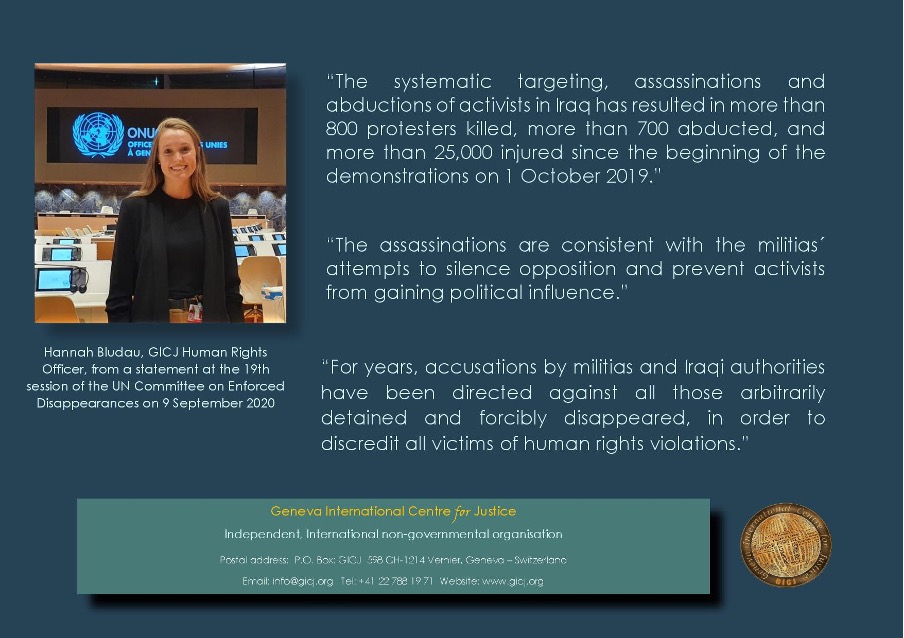
Ms. Bludau stressed to the Committee the complete and utter lack of action by the government in combatting these violations and holding the perpetrators accountable. Instead, Ms. Bludau informed the Committee that governmental officials and many politicians, including members of Parliament, are actively promoting the systematic targeting and increased acts of violence against activists and human rights defenders, denying the identity of the victims as activists and instead calling them U.S. foreign agents and thus a threat to Iraq. Ms. Bludau stated that these false assertions are an attempt to discredit the victims and justify the attacks and have been directed against all those arbitrarily detained and forcibly disappeared, which clearly shows that this is a tactic constantly used to discredit all victims of human rights violations.
In regard to the progress of Iraq ́s adoption of the draft law, to this date, Ms. Bludau informed the Committee that the government has not submitted that bill to the Parliament, despite the fact that the Ministry of Justice stated that the bill is under consideration by the State Council advisor. GICJ has obtained information that the Iraqi authorities indicate to the Council in certain ways, not to act on the bill. This is further evidence that the government continuously fails to implement its obligations and promises and further proves the governments complete lack of interest in providing solutions for the cases of disappeared persons.
Concluding Remarks
One year has passed since the demonstrations began and the violations continue to occur daily. No perpetrators have been held accountable. The Iraqi people continue to pay the highest price merely for exercising their fundamental rights.
The systematic impunity with which these violations occur is a testament to the Iraqi government’s incompetence to address the situation and reflects the international community’s deliberate turning of a blind eye. While there is much grandeur and flowery statements delivered at the Human Rights Council by member states on the importance of accountability as the new driving force for human rights on the global agenda, they remain meaningless promises unfulfilled in the eyes and lives of the Iraqi people.
The paradoxical question is how many more killings and enforced disappearances does the world require before it decides to act, to respond to the Iraqi peoples’ ongoing calls for justice and accountability and their calls for the dissolution of the sectarian system of government and the militias which thrive on division through violence. How many young activists must die for the international community to take notice?
What threat does the young activist and paramedic Sheelan Raoof pose? Likewise, what danger did the young and well-known activist Dr. Reham Yacoub present? And the young activist Yasser Kazim?
Why must human rights defenders fear for their lives when merely exercising their fundamental rights? The Iraqi people demand and are entitled to their human rights and to substantive democracy, peace, and justice.
GICJ will continue to pursue justice for the Iraqi people and demand accountability for the violations committed against them. Despite our repeated calls for action, the international community and the United Nations have been complacent in their response. They have not taken the Iraqi peoples’ plight and suffering seriously, and it is this laxity which has emboldened perpetrators to not only continue the violations, but to escalate them.
We repeat our calls to establish an independent, international Commission of Inquiry to investigate all human rights violations in Iraq since 2003, in order to hold all perpetrators accountable. We also call on all UN relevant bodies to take all required measures to put an end to these grave human rights violations.
The international community should listen to the voices of the young Iraqi generation and their call for change. All they demand is a better future. For 17 years they have been living in this situation, without proper education, without employment opportunities, without basic needs and services and now, without hope. We plead to the community to help this generation achieve a better future.
Click on the picture below to download the full report:
1 See UNAMI Special Report Demonstrations in Iraq 1-9 October 2019
2 See UNAMI Special Report Demonstrations in Iraq: update 25 October – 4 November 2019
3 See UNAMI Special Report Demonstrations in Iraq: 3rd update
4 The militias and the government are closely intertwined, dating back to the law passed by the Iraqi Parliament on 26 November 2016 recognizing the umbrella organization, Al-Hashd Al-Shaabi, as a legal and independent military corps. These armed Shi’ite militias have thus been officially recognized and legitimized by the government. It is practically impossible to distinguish the militias from the armed forces as they have been made an integral part of the armed forces, yet act outside of the scope of the government.
5 The experts include: Mr. Michel Forst, Special Rapporteur on the situation of human rights defenders; Mr. David Kaye, Special Rapporteur on the promotion and protection of the right to freedom of opinion and expression; Mr. Clement Nyaletsossi Voule, Special Rapporteur on the right to peaceful assembly and association; Ms. Agnes Callamard, Special Rapporteur on extrajudicial, summary or arbitrary executions; Mr. Nils Melzer, Special Rapporteur on Torture and Other Cruel, Inhuman or Degrading Treatment or Punishment; Mr. José Antonio Guevara Bermúdez, Chair, Working Group on Arbitrary Detention; access link at https://www.ohchr.org/EN/NewsEvents/Pages/DisplayNews.aspx?NewsID=25222&LangID=E
6 See GICJ Report for the 41st Session of the Human Rights Council
7 See GICJ Side-Event on Imprisonment and Torture
8 See GICJ Report for the 42nd Session of the Human Rights Council
9 See GICJ Side-Event on Enforced Disappearance and Extrajudicial Killings in Iraq
Read other GICJ reports on Iraq by clicking on the pictures below:
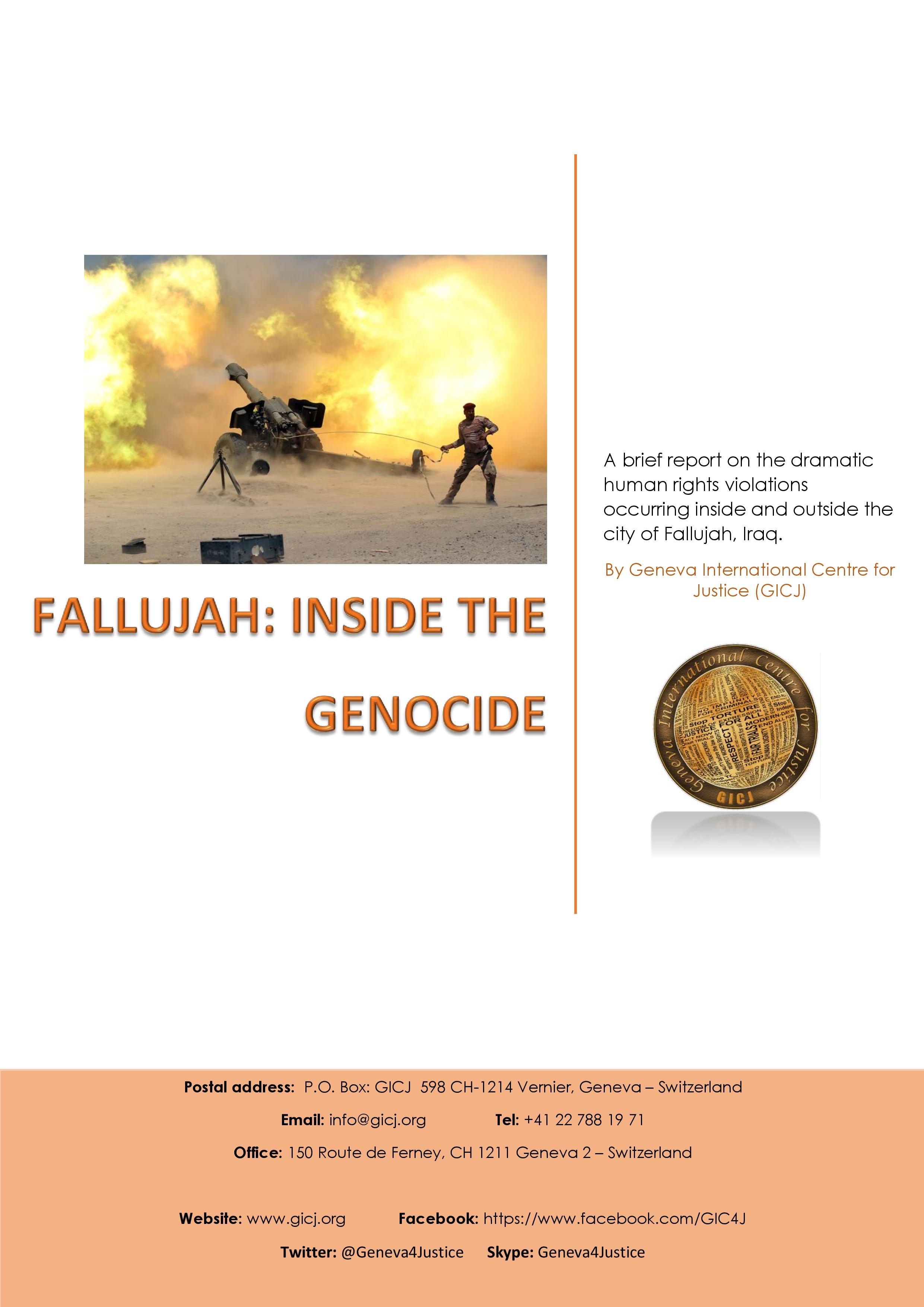 |
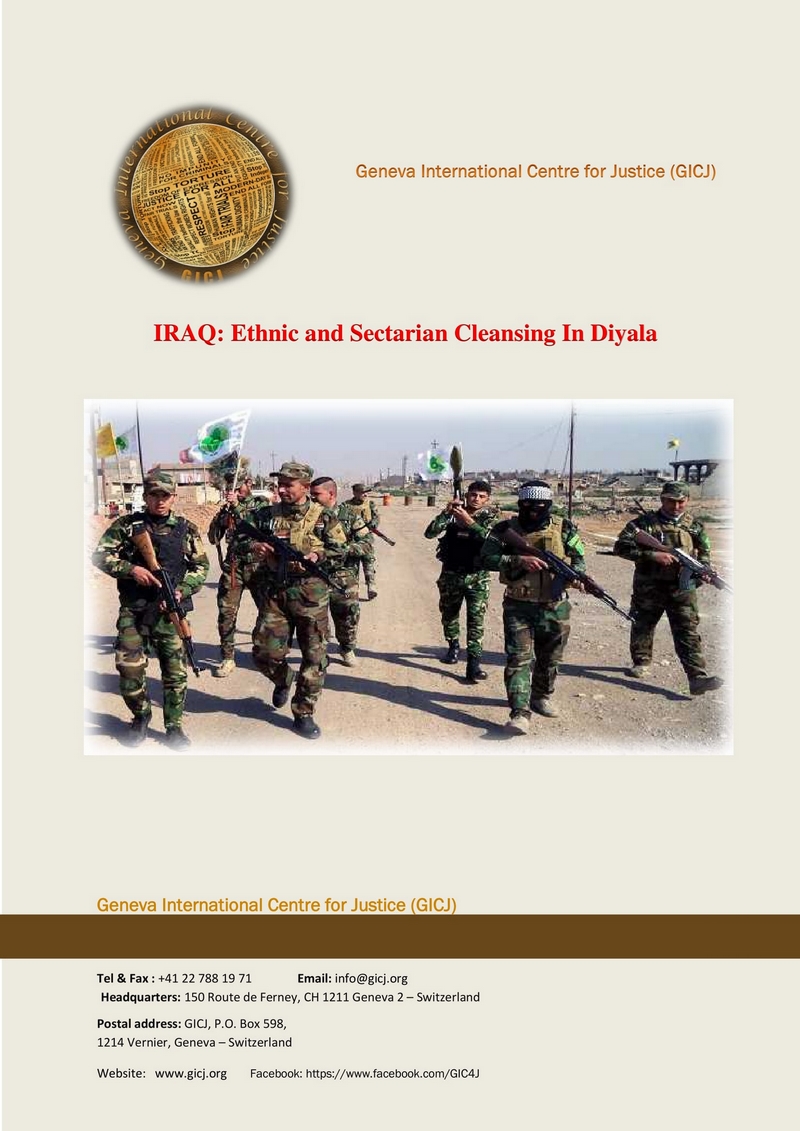 |
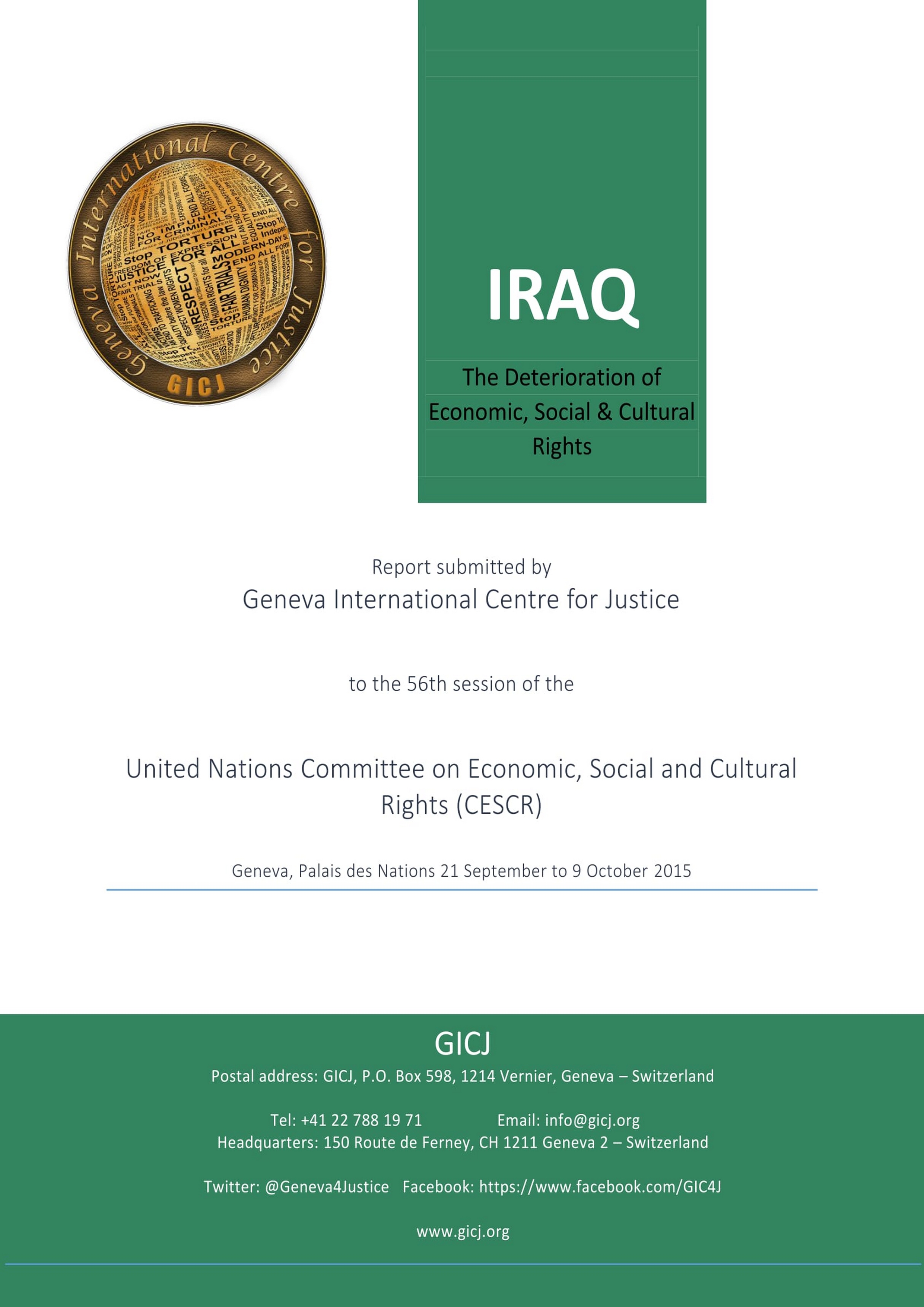 |
|
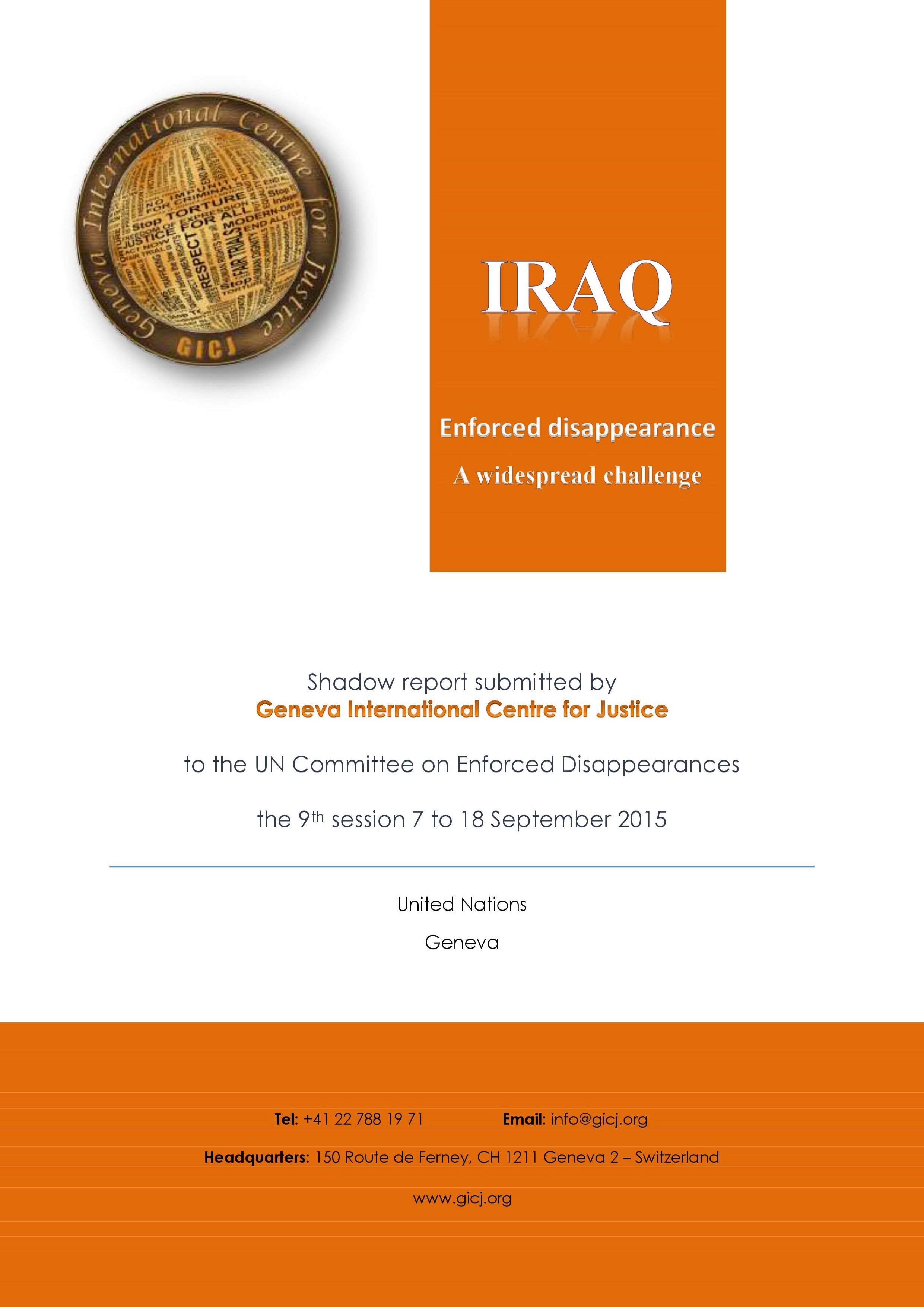 |
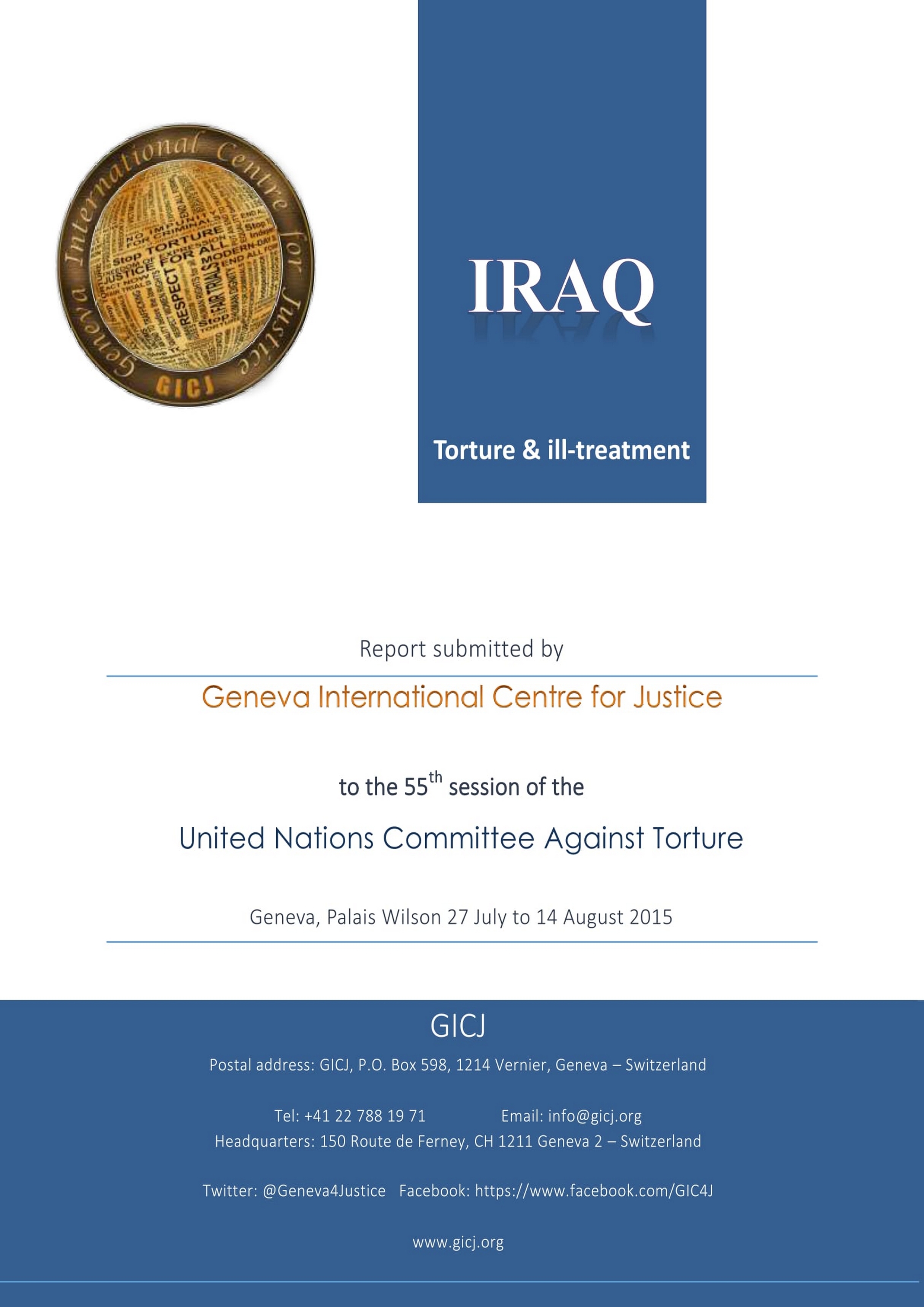 |
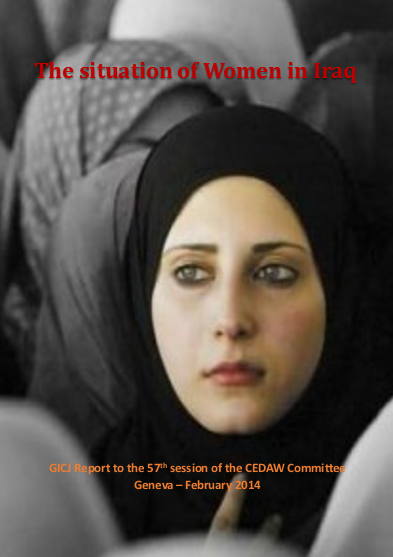 |







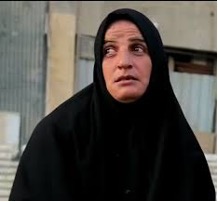 Donya, who became widely known as the seller of tissues, gave tissues away to injured demonstrators. Initially, she planned to sell them at the demonstrations, for it was her only source of income. However, in the first days of the demonstrations, once she witnessed the violence and saw the many severely injured demonstrators, she began giving them away. She has been hailed for her generosity and kindness. Her appearances at the demonstrations have inspired many women to participate.
Donya, who became widely known as the seller of tissues, gave tissues away to injured demonstrators. Initially, she planned to sell them at the demonstrations, for it was her only source of income. However, in the first days of the demonstrations, once she witnessed the violence and saw the many severely injured demonstrators, she began giving them away. She has been hailed for her generosity and kindness. Her appearances at the demonstrations have inspired many women to participate. Qais al-Khaz'ali - founder of Asa'ib Ahl al-Haq militia, very well known for committing grave human rights violations against the Iraqi people; He and his militia actively participatein the systematic and widespread targeting of human rights defenders and activists in Iraq, including countless assassinations and abductions.
Qais al-Khaz'ali - founder of Asa'ib Ahl al-Haq militia, very well known for committing grave human rights violations against the Iraqi people; He and his militia actively participatein the systematic and widespread targeting of human rights defenders and activists in Iraq, including countless assassinations and abductions. Hadi al-Amiri - leader and secretary general of the Badr Organization, an Iranian-sponsored Shiite militia and political party created in Iran. al-Amiri has a history of committing grave human rights violations. He is also responsible for the violations against the demonstrators, including intimidations, abductions and assassinations.
Hadi al-Amiri - leader and secretary general of the Badr Organization, an Iranian-sponsored Shiite militia and political party created in Iran. al-Amiri has a history of committing grave human rights violations. He is also responsible for the violations against the demonstrators, including intimidations, abductions and assassinations. Muqtada al-Sadr - leader of Saraya al-Salam militia, known as the Peace Companies. He is currently leading a majority bloc in the Iraqi Parliament. He and his militia control the demonstrations and manipulate the demands of the protesters. They are responsible for killing many demonstrators and political opposition. Most notably, on 9 September 2020, they murdered the family of Ali Ja´far Ali Al-Sultani, including his wife, two daughters and son, after Al-Sultani expressed criticism of al-Sadr on social media.
Muqtada al-Sadr - leader of Saraya al-Salam militia, known as the Peace Companies. He is currently leading a majority bloc in the Iraqi Parliament. He and his militia control the demonstrations and manipulate the demands of the protesters. They are responsible for killing many demonstrators and political opposition. Most notably, on 9 September 2020, they murdered the family of Ali Ja´far Ali Al-Sultani, including his wife, two daughters and son, after Al-Sultani expressed criticism of al-Sadr on social media. Abu Mahdi al-Muhandis – assassinated by the US near Baghdad airport on 3 January 2020, real name Jamal Jafaar Mohammed Ali Ebrahimi, famous international criminal and deputy leader of the "popular mobilisation committee" with close connections to the leader of the Iranian Quds force. The demonstrators accused him of planning several attacks against them along with Qassem Soleimani.
Abu Mahdi al-Muhandis – assassinated by the US near Baghdad airport on 3 January 2020, real name Jamal Jafaar Mohammed Ali Ebrahimi, famous international criminal and deputy leader of the "popular mobilisation committee" with close connections to the leader of the Iranian Quds force. The demonstrators accused him of planning several attacks against them along with Qassem Soleimani. Qassem Soleimani – assassinated by the US near Baghdad airport on 3 January 2020, Commander in chief of the Iranian Quds force, a branch of the Revolutionary Guard Corps. He was a fundamental accomplice of the crimes committed in Iraq, coordinating his actions with Nouri Al-Maliki, Hadi Al-Amiri and Abu Mahdi Al Muhandis. He acted as tactician and commander of several operations conducted by the militias against the demonstrators.
Qassem Soleimani – assassinated by the US near Baghdad airport on 3 January 2020, Commander in chief of the Iranian Quds force, a branch of the Revolutionary Guard Corps. He was a fundamental accomplice of the crimes committed in Iraq, coordinating his actions with Nouri Al-Maliki, Hadi Al-Amiri and Abu Mahdi Al Muhandis. He acted as tactician and commander of several operations conducted by the militias against the demonstrators.
